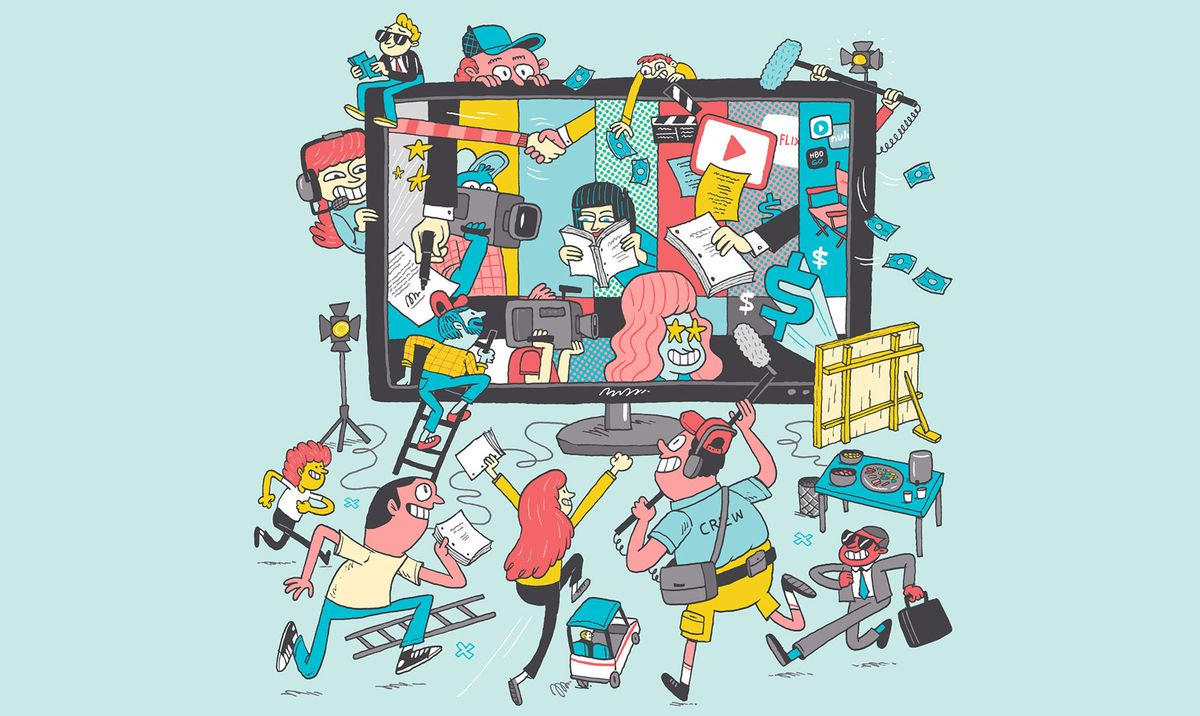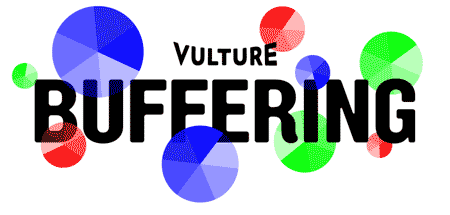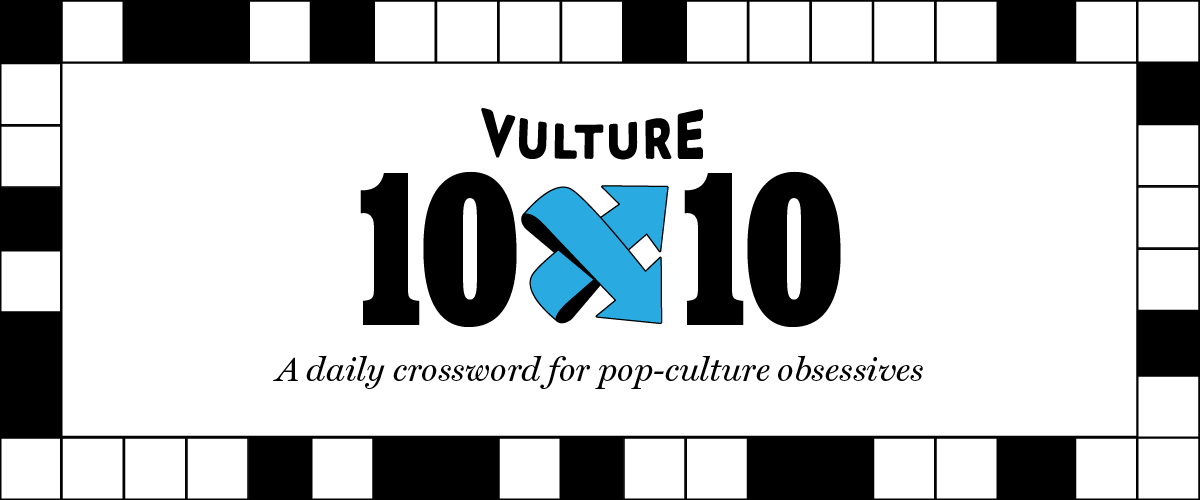 Happy National Game Show Day — yes, it's really a thing — and welcome back to Buffering. This week's edition features some time travel: While doing research for a New York Magazine story that hopefully will be dropping soon, I dug up a piece about Peak TV I worked on back when Barack Obama was still president. I was struck by how so many of the themes in it still apply today, enough so that it inspired today's newsletter. By the way, my co-author on the story, former Vulture Maria Elena Fernandez, just so happens to have a book coming out next week: It's the oral history of RuPaul's Drag Race, and you can pre-order it here (and read a 2017 deep dive she did on the show here). As always, thanks for reading! –Joe Adalian | | Enjoying Buffering? Share this email with your friends, and click here to read previous editions. | | Stay updated on all the news from the streaming wars. Subscribe now for unlimited access to Vulture and everything New York. |  | ![]() | | Illustration: Greg Kletsel | | | | Seven years ago, my former Vulture colleague Maria Elena Fernandez and I spent several months interviewing nearly two dozen Hollywood insiders about what was then a relatively new phenomenon: Peak TV. It had only been about 18 months since FX boss John Landgraf had coined the phrase for the enormous production surge that was just then hitting the television business, but already, the town was starting to feel shell-shocked by the changes — and was even a little excited. One studio chief we talked with expressed hope about what the new era might bring. "It's the end of 'Who gives a shit?' television," he said. "It all has to be great." | | And for a while, it was — at least for audiences. There's been a ton of amazing television produced over the last half-decade. We just said good-bye to a lot of it: Succession, Barry, The Marvelous Mrs. Maisel, and (possibly) Ted Lasso all just aired their series finales. But over the past year or so, the music has stopped. Netflix's stock slide triggered a year of cutbacks and consolidation in the business, and last month, Hollywood writers put their laptops down and went on strike, fed up with all the negative consequences streaming has brought. | | I've been spending some time once again talking to industry insiders about where things stand now, and you can expect more in this space soon. But this week, I wanted to go back in time and reexamine the story Maria Elena and I did in 2016 — "The Business of Too Much Television" — to see how much of it still felt relevant today. I was actually a bit stunned at how much of the themes dominating headlines about TV today were predicted by our sources even then: | | Top industry execs saw the Netflix correction coming. | | For most of the decade after Netflix launched House of Cards, the narrative around streaming focused almost exclusively on expansion: massive spending, more new platforms, surging subscriber counts. So when the entire industry suffered a massive reset last year following a single quarter of bad results at Netflix, it all felt pretty dramatic and shocking. And yet, the insiders we spoke to back in 2016 called what happened with almost eerie precision. From our story: | | ➽ A partner at a major Hollywood agency told me he worried that, as we wrote then, "a single stock-market hiccup could, in short order, turn the boom into a bust. 'I'm concerned that something happens in the stock market, and Netflix takes a big tumble or Amazon takes a big tumble, and they ratchet back their spending,' he says. 'Between Netflix, Hulu, and Amazon, you're talking about $10 billion being introduced into the ecosystem of Hollywood, between buying library content and funding original content. That's a huge number. Everybody would suffer if any of that went away.'" | | ➽ Disney TV Studios chief Eric Schrier, who back then headed programming for FX under Landgraf, was even more direct. "There's always going to be a robust amount of television produced, but not all of these businesses can sustain this level of production," he predicted. "Some day, the bill's going to come due on the people that are not making the profits that their shareholders will need them to make." This is basically exactly what happened: Wall Street's demand that entertainment conglomerates start making money on streaming ASAP has prompted thousands of layoffs and numerous shows to be mothballed. | | ➽ Veteran showrunner Julie Plec was properly wary of a system of nonstop spending with little ability for platforms to make money off it. "Right now everybody is like, 'Yay! Free-for-all!' because nobody outside of the deepest, deepest inner circles knows how anybody monetizes anything anymore," she told us. "It's like a sleight-of-hand trick. It either makes complete sense and there's plenty of money to go around — or it's a total house of cards, where a good sneeze could tear it down." Netflix is still standing, but it definitely caught a very bad cold. | | They knew talent prices were soaring, but had no idea how high they'd go. | | A full year before Paramount Network officially announced that Kevin Costner would star in Yellowstone, our story broke the news that the veteran film actor was in the market to make the leap to television. "Multiple sources have told Vulture that Kevin Costner was offered $500,000 per episode to do a ten-hour series for one of the Big Three streaming networks, a deal that would have paid him $5 million for about three and a half months of work," we reported. That number now seems quaint: Variety last year estimated Costner is now pulling down $1.3 million per hour, not a huge shock given the show is linear TV's most-watched entertainment broadcast. What's more telling is what actors are now getting for first-year shows on streamers. Variety says Elisabeth Moss made $1.1 million an episode for Apple TV's limited series Shining Girls, while Max paid Elizabeth Olsen $875,000 per episode for Love & Death. Overall, the trade says top-shelf actors are now regularly pulling down between $750,000 and $1 million an episode. | | There were concerns cable originals could decline. It was even worse than feared. | | Back in 2016, there was still a very active ecosystem of linear-TV hits (this was the year Mr. Robot and Orphan Black made a splash at the Emmys for USA Network and BBC America). Everyone knew streaming was growing but it felt almost a little melodramatic to include this quote in the story back then. "Cable spending on original programming is starting to slow down, or even reverse," we wrote. As the head of one major studio told us back then: "The cable networks have had a decent pile of cash that's absolutely now tapped out. The historic growth that has happened over the last decade in cable, whether it's basic or premium, has been pretty fantastic. [But] we all know that has slowed, plateaued, and, in some cases, declined." That studio chief had no idea how right they were: Today, basic cable has all but abandoned scripted fare (with Paramount Network's Yellowstone the only megahit), while HBO and FX are now focused on building their streaming brands. | | Some worried that shows would get lost in the wave of too much TV. | | "For a couple of years, every show Netflix or Amazon launched was an event, met by a ton of free publicity from entertainment websites," our story noted. "That still happens, but lately some streaming shows have come and gone with nary a blip on the pop-culture radar. One TV showrunner notes that already Netflix is 'not buying billboards for everything and not putting [every show] up in the front of their Recommend page.'" Over the next few years, as Netflix and new streamers started launching multiple new shows every single week, this vague worry turned into one of the biggest gripes showrunners have in the age of streaming: As one insider told me recently (and I'm paraphrasing here), "If the algorithm doesn't suggest your show, does it even really exist?" | | Talent agents of mid-level stars raised alarm bells about how bad Peak TV would end up being bad for many actors and writers. | | Our story mostly focused on how everyone in Hollywood was scrambling to keep up with the Netflix-led content boom, and how top actors and writers were signing lucrative deals. But even then, some saw the potential pitfalls of streaming: | | ➽ "Peak TV, with its 400-plus shows and evolving array of networks and platforms, is an increasingly promising time for beginning and mid-level writers who are finding it easier than ever to land staff jobs," we wrote. "The downside is they are making less money. As shorter seasons become even more common on cable, streaming services, and even some network shows, writers are faced with a new challenge: cobbling together deals on different shows to keep themselves working throughout the year." | | ➽ There were also worries about what would happen to residuals and syndication profits, fears everyone in Hollywood pretty much chose to ignore for years. "It's very, very, very hard to create true long-term asset value with sophisticated premium programming in today's world," a veteran agent told us in 2016. And future head of Max originals Sarah Aubrey, who was then running programming for TNT, already saw the problems writers and producers would soon face making profits off their hits. "The syndication money … the big bonanza at the end of that rainbow, that just seems all the harder to attain," she said. | | ➽ Some big names were already worried about how the Netflix model of paying more for all shows but not really rewarding success — or even admitting success — would come back to bite creators who launched big hits. "Their model right now is to overpay up front because they don't really have a backend structure," director Steven Soderbergh said. "That's only gonna fly for so long, because at a certain point, if I go create a valuable asset for Netflix or Amazon and the thing blows up, I want to participate in that. … I'll take less money up front for … real participation in wild success. I'm always willing to gamble on myself." And yet, as streamers took over TV, more adapted the Netflix financial mode, and even talent like Soderbergh had no choice but to play ball. Two years after he spoke to us, the director sold the rights to his film High Flying Bird to Netflix. | | Sign up to receive Vulture's 10x10 crossword every weekday. | | | |






No comments:
Post a Comment
Keep a civil tongue.